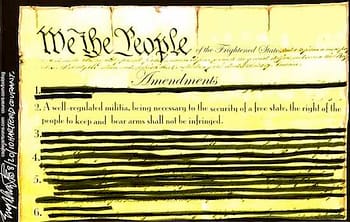"None of Your Civil Liberties Matter Much After You're Dead"

As the Obama administration and Congress ponder their responses to the slaughter in Newtown, Connecticut, one of the central tensions in the American system of government is once again coming to the fore. That is, the freedoms enshrined in our Constitution's Bill of Rights are neither absolute nor in harmony with each other. For example, knowing, malicious libel is not protected speech under the First Amendment. Parents cannot on religious grounds willfully withhold live-saving care from their sick child.
So it is, too, with the Second Amendment. Even in the wake of the Supreme Court's landmark 2008 Heller ruling recognizing an individual right to bear arms for self-defense in one's home, federal courts have upheld hundreds of restrictions limiting who may legally own guns, what types of weapons Americans may possess, and where that firepower may be carried.
Yet even as guns are used to murder over 12,000 people in the United States annually--that is, the equivalent of four 9/11 massacres each year--many of the usual suspects insist that government cannot and should not in any way constrain the rights of law-abiding Americans. Sadly, many of those same voices argued the exact opposite in the aftermath of the September 11 carnage.
For example, take Senator and former chief justice of the Texas Supreme Court John Cornyn. Cornyn, a fervent supporter of the Bush administration's regime of detainee torture, led the Republican counterattack against the December 2005 revelations that the National Security Agency (NSA) was conducting illicit, warrantless electronic surveillance of U.S. citizens. His response became the GOP's talking point on President Bush's clear violation of both the Foreign Intelligence Surveillance Act (FISA) and the United State Constitution:
"None of your civil liberties matter much after you're dead."
Cornyn (whose campaign website darkly warns that "liberal activist judges want to remove your right to bear arms!") had plenty of company. Then-Senate Intelligence Committee Pat Roberts (R-KS) joined the chorus, declaring:
"You really don't have any civil liberties if you're dead."
Alabama Senator Jeff Sessions also got in on the act. The failed Reagan judicial nominee turned ranking Republican on the Senate Judiciary Committee blessed Bush's disregard of the law this way:
"Over 3,000 Americans have no civil rights because they are no longer with us."
In their quest to avoid a repeat of the 9/11 terror attacks, these and other Republicans (and some Democrats) were more than willing to trample the Bill of Rights. The abrogation of habeas corpus, indefinite detention of U.S. citizens, the misuse of "National Security Letters" to monitor Americans' phone records, emails and other communications were just some of the extra-legal measures undertaken by the Bush administration at the expense of Americans' fundamental rights.
But there was one line even Team Bush and its GOP allies would not cross. Protecting gun owners, it turned out, was even more important that protecting the American people from Al Qaeda.
On December 6, 2001, the New York Times detailed what Mathew Nosanchuk of the Violence Policy Center called "a gun-rights exception to the war on terrorism":
The Justice Department has refused to let the F.B.I. check its records to determine whether any of the 1,200 people detained after the Sept. 11 attacks had bought guns, F.B.I. and Justice Department officials say.
The department made the decision in October after the F.B.I. asked to examine the records it maintains on background checks to see if any detainees had purchased guns in the United States.
Attorney General John Ashcroft was nothing if not consistent. As a Senator from Missouri, Ashcroft in 1998 voted for a failed amendment to the Brady gun-control law to destroy any records immediately after checking the background of a prospective gun buyer. During Senate testimony in In late 2001, he did not back down from his controversial policy of preventing FBI access to the N.I.C.S. database, a policy opposed by the International Association of Chiefs of Police:
"Why is the department handcuffing the F.B.I. in its efforts to investigate gun purchases by suspected terrorists?" asked Senator Edward M. Kennedy, Democrat of Massachusetts.
Mr. Ashcroft said that he believed the law that created the national directory of gun purchase applications could not be used for anything other than an audit of the system.
"I believe we did the right thing in observing what the law of the United States compels us to observe," he said.
In response, Senator Dick Durbin (D-IL) accused Ashcroft of "putting the interests of the gun lobby above the nation's public safety in the battle against terrorism."
As we fast-forward to the bloodbath at the Sandy Hook elementary school, the NRA and its allies will now have to answer for putting the interests of the gun lobby above the safety of America's children and their teachers.
After all, they had rights, too. And their liberties matter very much--even after they're dead.

